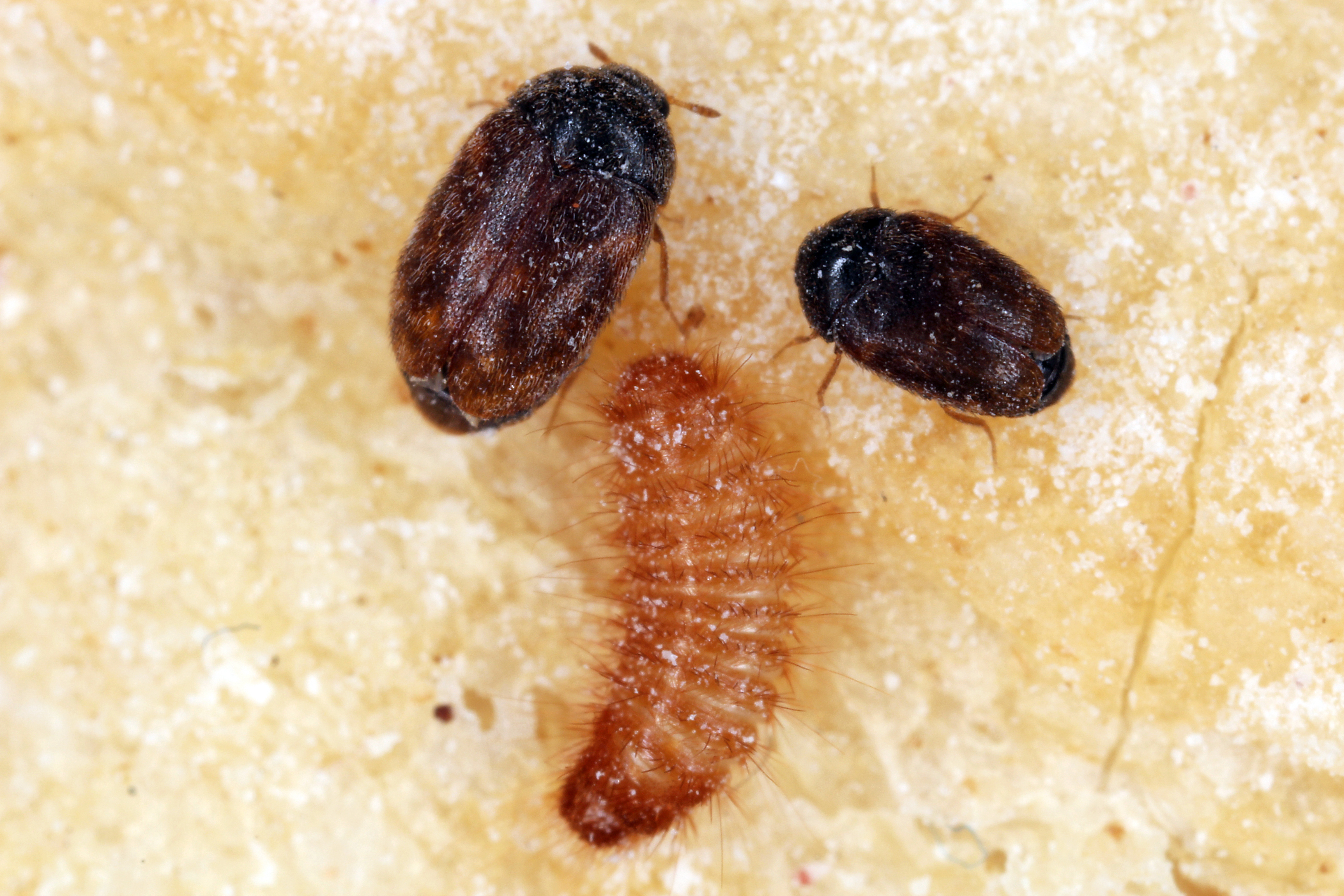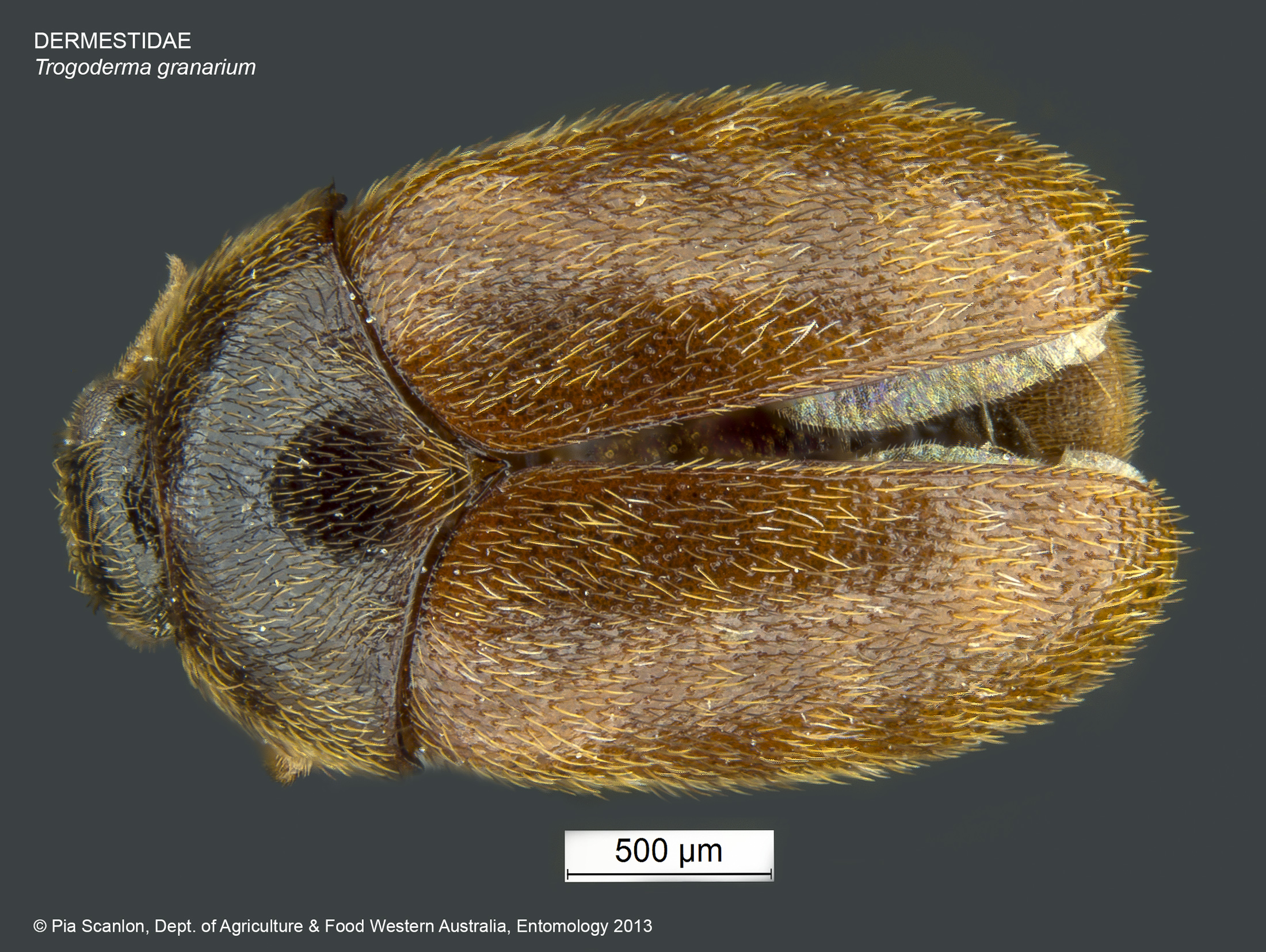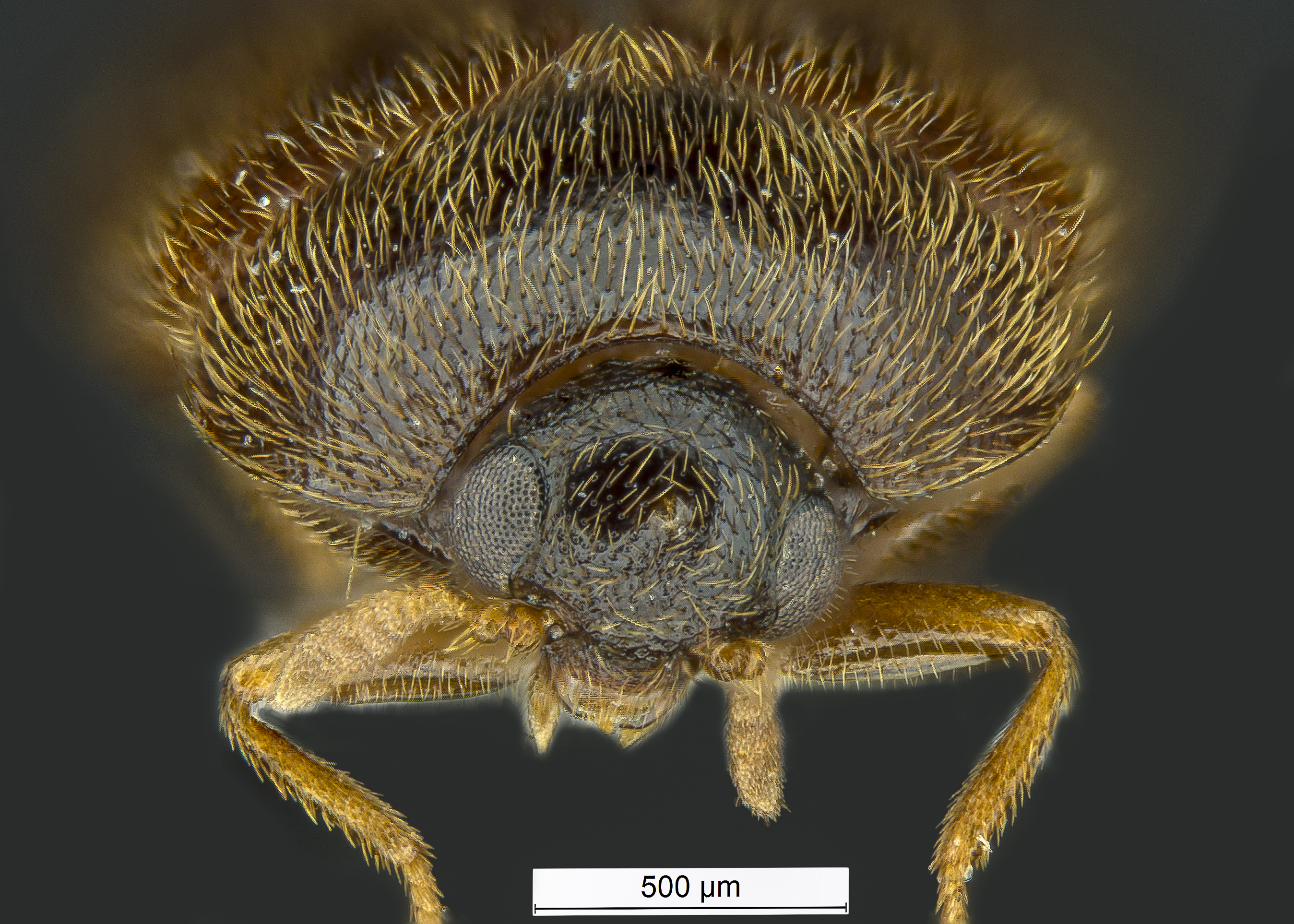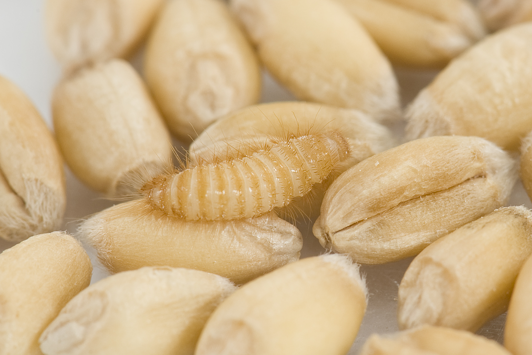
Khapra beetle is a declared pest in WA
Khapra beetle is one of the most serious pests of stored grain products, especially under hot and dry conditions. It is not known to occur in WA and must be reported to the department if found or suspected to be present.
Current Situation
The Commonwealth, along with state and territory governments, is responding to a detection of khapra beetle (Trogoderma granarium) in imported nappy pants.
All goods associated with this shipment are being traced and will be secured and treated to ensure they do not pose an ongoing biosecurity risk.
Australia maintains a pest free status for khapra beetle. There has been no change to Australia’s trade status.
For more information visit the Australian Government's website on khapra beetle.
About khapra beetle
Khapra beetle (Trogoderma granarium) is one of the most serious pests of stored grain products, especially under hot and dry conditions.
Khapra beetle is a regulated quarantine pest in many countries and currently absent from Australia. Our international trade would be severely impacted if it became established here.
Khapra beetle will feed on most dried plant or animal matter. It can feed on products with as little as 2% moisture content and can develop on animal matter such as dead mice, dried blood and dried insects. Its preferred grain and cereal products are wheat, barley, oats, rye, maize, rice, flour, malt and noodles.
It also feeds on:
- soybeans, lentils, dry peas, grain sorghums, cowpea and corn
- rolled and ground barley, ground corn, ground dog food, rolled oats, dried orange pulp, ground rice, and cracked and ground wheat bran
- peanuts, pecans, walnuts and almonds.
Other commodities that often serve as hosts include:
- bread, dried coconuts, cornmeal, crackers, white and wholemeal wheat flour, pasta, dry baby food, pearl barley and wheat germ
- rat and mouse baits, snail pellets.
Khapra beetles are small, oval-shaped and densely hairy, reddish-brown beetles.
- 1.5 to 3.5 mm long, 1.1 to 2.0 mm wide
- head and the first third of the body is dark reddish-brown
- wing covers (elytra), reddish- or yellowish-brown, usually with indistinct lighter bands marked by whitish hairs
- venter (underside) of body, reddish-brown
- legs, yellowish-brown
- hairs (setae) on the dorsal surface are of two types: evenly distributed, yellowish-brown; and on the wing covers two or three bands of indistinct yellowish-white
- middle eye (median ocellus) on the front of the head is always distinct
- antennae are yellowish-brown, short, with a distinct club.


Dorsal diagnostic image of Trogoderma granarium. Photo – © 2013 Pia Scanlon
Newly hatched larva are whitish with yellowish-white hairs, 1.6–1.8 mm long and 0.25–0.3 mm wide. A little more than half of the length comprises a long tail of a number of hairs.
Mature larva are creamy coloured and covered with dense, brownish hair, about 6 mm long and 1.5 mm wide.
Note: Warehouse, carpet and hide beetle larvae are almost identical in appearance to khapra beetle larvae. Only microscopic examination can separate them, so specimens should be sent to the DPIRD for positive identification.
Please see PaDIL (Pests and Diseases Image Library) for high quality diagnostic and overview images.
If khapra beetle infestations are left undisturbed in stored grain they can cause significant weight loss and may lead to significant reduction in seed viability. Weight loss can be 5-30% and in extreme cases 70%.
Larvae typically attack the embryo point or a weak place of grain or seed, but will attack other parts during heavy infestations. Young larvae feed on damaged seeds, while older larvae are able to feed on whole grains.
Khapra beetle can also damage dried animal products. Large numbers of larval skins and setae (hairs) may cause dermatitis and/or allergic reactions. Larvae wander in and out of sacked material, weakening the sacks, which may ultimately tear.
Due to their resilience and ability to survive without food for years, an infestation can stay undetected in cleaned warehouses and silos. Once the facility is refilled with dry commodities the khapra beetle population can explode and cause significant damage in a short period of time.
Life stages
- Reproduction involves males and females. The development and survival rate depend on quality and availability of food, temperature and humidity. Based on these factors it can have 1–9 generations per year.
- High humidity slows population build-up yet will help to increase the numbers of other stored product pests which will outcompete it. Females lay 50–100 eggs which are extremely difficult to find.
- Larval development usually takes 4–6 weeks depending on conditions. Larvae moult 4–15 times.
- The larval stage can last from a month to several years if it enters a period of suspended development (diapause). Pupation always occurs in the last cast skin and this stage lasts 2–5 days.
- Adult khapra beetles live 12–25 days, though adults can rarely be found since their offspring quickly devour their bodies for its protein content. Larvae are also capable of surviving without food for several years.
Habitat
Khapra beetle occurs almost exclusively in closed environments in agricultural and urban areas. In agricultural areas it is associated primarily with silos, storages and animal holding facilities. In urban environments it is found within human dwellings (synanthropic) and in stores, food stores, malt houses, seed processing plants, fodder production plants, dried milk factories, merchant stores and stores of packing materials (used sacks, bags, crates).
It is found in hot, dry conditions, predictably in areas which have a mean temperature greater than 20°C and relative humidity below 50% for at least four months of the year.
Distribution
Trogoderma granarium originated from the Indian subcontinent and now is established throughout the warm dry regions of the Middle East, Asia and the Indian subcontinent.
The khapra beetle has been introduced into areas with similar climatic conditions, especially the alternative route between India and Europe around Africa. Initially, these introductions caused severe damage but outbreaks have been local and in most cases have been eradicated or died out. New incursions in developed countries are quickly eradicated, sometimes at great expense.
Control and management
Eradication of khapra beetle can be difficult due to its habit of hiding in cracks and crevices, and ability to enter an inactive state which reduces its susceptibility to some control methods. Control methods designed to eradicate existing or new infestations must be able to penetrate the infested material throughout the facilities. In cases of low level of infestation, detection by inspection is not reliable.
In storage facilities pheromone trapping and larval traps have proved to be useful surveillance tools. Inspectors should be aware of the potential for inadequately cleaned shipping containers to harbour an infestation, especially in the sub-floor area. Because larvae can survive for years without food, infestations can be found in containers transporting non-food products.
Khapra beetle is of great quarantine concern. Inspection at ports and entry points provides an effective way to restrict entry of this pest. The Diagnostic Protocol for the regulated pest Trogoderma granarium prepared by the European and Mediterranean Plant Protection Organization (EPPO), in English and French recommends means of positive identification and detection of the insect pest.
The protocol also includes description, impacts, host range, geographical distribution. The Pest Risk Assessment of khapra beetle conducted by the United States Department of Agriculture, Animal and Plant Health Inspection Service, Plant Protection and Quarantine (USDA, APHIS, PPQ), addresses the likelihood of the beetle becoming established in the United States, the economic consequences, and available information regarding pathways, probability of detection, and marketing/export consequences of infestation in the US.
Growers should also take preventative measures on farm by keeping an eye out for 'hitchhiker’ pests, such as khapra beetle, to ensure early detection and prevent spread. When opening imported cargo, pallets or packages, follow the below guidelines:
- Vehicles, machinery etc delivered on pallets should be opened on concrete, and in a contained environment, if possible.
- DO NOT open in the paddock or close to crops or storage.
- Check packaging/goods carefully.
- If you find something close the container/package or create a barrier (such as a blanket or tarpaulin), and isolate.
- Take photos, recording the location and collect a specimen if safe to do so. Use a knockdown spray as a last resort. Don’t use a knockdown spray if it will cause the insects to disperse.
Look for small beetles, larvae or cast skins found in cracks and wall linings of storage containers. Report any findings IMMEDIATELY.
In India, the use of deoiled neem (Azadirachta indica) seed powder and diatomaceous earth powder mixed into wheat seemed to be an effective and cheap method to control the pest in stored wheat, though these are not accepted for eradication or quarantine treatment.
Heat treatment has proved very effective. The treatment involves a 30-minute exposure at 60°C which has given a 100% kill of all stages of the beetle. Mortality of larvae begins at 42.5°C. Complete mortality however required eight days exposure at that temperature.
Inactive larvae are more resistant to high temperatures than non-diapausing ones. When heat treatment is used it is imperative that the centre of the stored product should be maintained at the desired temperature for at least half an hour.
Treatment with fast electrons, using a linear accelerator, could provide an efficient method of controlling khapra beetle in store grain.
The most effective and only reliable treatment is methyl bromide fumigation. Control requires a higher than usual concentration of methyl bromide because different developmental stages and physiological states (diapause) show different sensitivity.
Replacement of methyl bromide with phosphine, carbon dioxide, carbonyl sulphide, sulfuryl fluoride and other fumigants is being investigated. Similarly, there are many very promising trials using controlled atmosphere where the oxygen content is kept very low and/or replaced by nitrogen or carbon dioxide. However, these methods have either low penetration or need prolonged exposure which is difficult to achieve.
Surface treatment is not reliable because of the unique ability of larvae to spend longer periods of time hiding in cracks and crevices in inactive state. Khapra beetle is known to show signs of tolerance or resistance to phosphine and malathion.
Facilities that cannot be fumigated may be sanitised and treated with a surface application of insecticide, but these are not reliable and not acceptable for eradication. Malathion applied repeatedly is currently approved for control of khapra beetle infestations in structures and surrounding surface areas.
Acknowledgements
Andras (Andy) Szito, Curator/Entomologist, Department of Primary Industries and Regional Development (entomology).
WA’s freedom from khapra beetle is supported by general and specific surveillance and specific import requirements to prevent its entry.
Legal duty to report
Khapra beetle is not known to occur in WA.
Trogoderma granarium (Everts, 1899) is a declared pest under section 12 of the Biosecurity and Agriculture Management Act 2007.
This means that any person who finds or suspects the presence of khapra beetle must report it to DPIRD.
Report suspected khapra beetle
Early detection and reporting will help protect WA agriculture and international trade.
If you find or suspect the presence of khapra beetle, report it immediately.
For pest reports related to imported goods, make a report to the Federal Department of Agriculture, Water and the Environment, or call the national See. Secure. Report hotline on 1800 798 636.
Related content
- Datasheet on khapra beetle (EPPO)
- PaDIL - Khapra beetle species page (PaDIL)
- Pest and Disease Information Service (PaDIS)
- Pest risk assessment of khapra beetle (Pest Tracker)
- Stored grain information hub (Stored Grain)
- Trogderma adult dissection video (DPIRD on YouTube)
- Trogoderma larvae dissection video (DPIRD on YouTube)
- Western Australian Organism List (WAOL)

